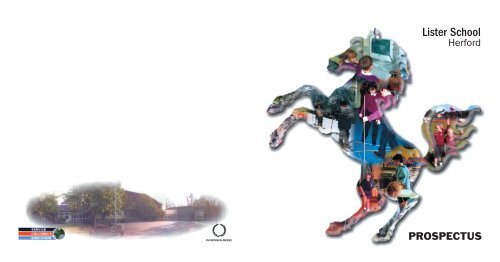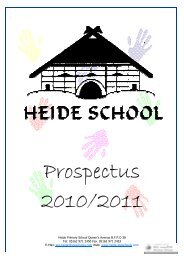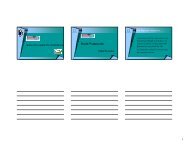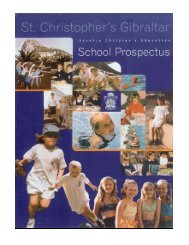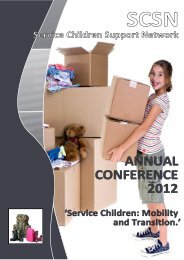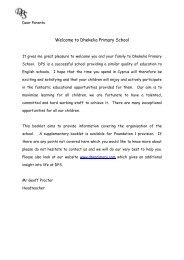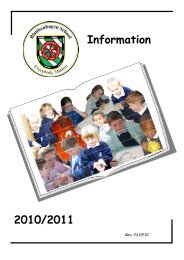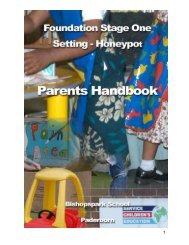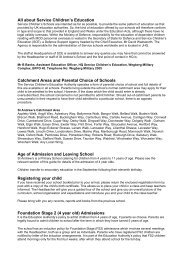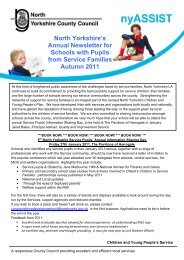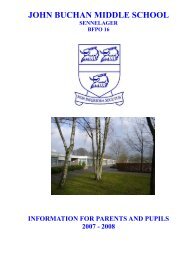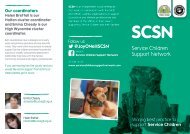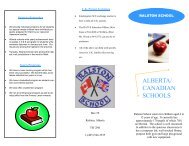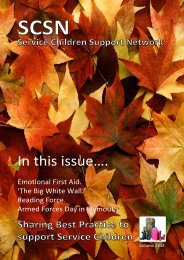Lister Brochure - Service Schools Mobility Toolkit
Lister Brochure - Service Schools Mobility Toolkit
Lister Brochure - Service Schools Mobility Toolkit
Create successful ePaper yourself
Turn your PDF publications into a flip-book with our unique Google optimized e-Paper software.
<strong>Lister</strong> School<br />
Herford<br />
PROSPECTUS
LISTER SCHOOL – STAFF<br />
LISTER SCHOOL<br />
The staff currently comprises 14 full time teachers. In addition to this, the school employs 2 secretaries,<br />
4 special needs teaching assistants, 13 teaching assistants and a full time caretaker. There is a curriculum<br />
development teacher for German language.<br />
Listed below is a Who’s Who of the Teaching Staff<br />
Headteacher<br />
Acting Headteacher<br />
Acting Deputy Headteacher<br />
Foundation Stage 1 Manager<br />
Foundation Stage 2<br />
Phase Leader KS1<br />
Year 1<br />
Year 2<br />
PPA Teacher<br />
- Mr A Atkin<br />
- Miss M Fairhurst<br />
- Mrs C Atkin<br />
- Mrs C Atkin<br />
- Miss C Pickering<br />
- Mrs S Provost<br />
- Mrs L Gill<br />
- Mrs T Churchill<br />
- Mrs S Churchward<br />
- Mr T Trevitt<br />
Year 3/4<br />
Year 5/6<br />
- Miss L Watson<br />
SENCO<br />
- Miss A Dhany<br />
- Miss C Russel<br />
- Mrs N Hird-Shaw<br />
Advanced Skills Teacher<br />
- Mr J Gill<br />
Key Stage 2 Co-ordinator<br />
- Mrs L Humphries<br />
Advanced Skills Teacher<br />
Official Address:<br />
German Address:<br />
Email:<br />
Website:<br />
<strong>Lister</strong> School<br />
BFPO 15<br />
Britische Schule<br />
Wentworth Kaserne<br />
Vloether Strasse<br />
32049 Herford<br />
sce.lister@sceschools.com<br />
www.listerschool.com<br />
Fax: From UK: 0049 5221 995 3678<br />
Civil: 05221 995 3678<br />
Telephone: Military: Herford (82) Ext 3305<br />
Civil: 05221 995 3305<br />
From UK: 0049 5221 995 3305<br />
Headteacher:<br />
Acting Headteacher<br />
Mr A J Atkin<br />
Miss M Fairhurst<br />
School Hours: 0845 to 1200<br />
1300 to 1500<br />
Please note that the school assumes legal<br />
responsibility for the children only from<br />
0835 hours when the playground is supervised<br />
by the Duty Teacher.<br />
School Transport:<br />
School buses, with escorts are<br />
provided by the Station and are<br />
the responsibility of the Station<br />
Staff Officer. Timetables are<br />
published by the Station Staff<br />
Officer.<br />
www.listerschool.com<br />
All queries regarding transport, should be directed<br />
through the Housing and Community Support Office.<br />
They can be contacted on Ext 3001.<br />
www.listerschool.com
The Aims Of <strong>Lister</strong> School<br />
THE CHILD GUIDANCE SERVICE<br />
The following are the aimsof the School and are based<br />
on the broad aims agreed by SCE.<br />
What is it?<br />
Who refers the child to the Child Guidance Centre?<br />
Our School is:<br />
Welcoming and Friendly<br />
Encouraging and supportive<br />
Informative and stimulating<br />
Our community makes the most of:<br />
Local links<br />
Partnerships<br />
Networks<br />
Teams<br />
Our Learning and Teaching has:<br />
1st hand experiences<br />
A varied, challenging and exciting curriculum<br />
Knowledge of the next steps in learning<br />
Excellent teaching<br />
Ways to celebrate success<br />
Parental commitment<br />
At <strong>Lister</strong> School our aim is to promote the following values:<br />
Build Self Esteem<br />
We value ourselves as unique human beings.<br />
Respect one another<br />
We value others for themselves.<br />
Learn for life<br />
We strive for knowledge wisdom and understanding.<br />
Develop Potential<br />
We take responsibility for our learning.<br />
The Child Guidance <strong>Service</strong> consists of a team of staff<br />
with various professional skills. They work and advise on<br />
children having a wide range of difficulties. There are<br />
four teams in Germany each based at the Child<br />
Guidance Centres. The address of the Centre serving<br />
<strong>Lister</strong> School is Child Guidance Centre, Osnabruck, BFPO<br />
36<br />
Who are the staff?<br />
The staff of the Child Guidance Centres offer help<br />
andadvice to children, parents and teacher. The types of<br />
difficulties mainly dealt with include:<br />
• Learning difficulties<br />
• Special Educational Needs<br />
• Behavioural and adjustment difficulties at home<br />
or school<br />
• Emotional difficulties<br />
• Speech and language difficulties<br />
Children are referred to the Child Guidance<br />
Centre mainly by:<br />
<strong>Schools</strong>, SSAFA, Parents, Unit Medical Officers When<br />
schools, medical personnel or SSAFA<br />
refer a child they will have first discussed the child’s difficulties<br />
with parents, suggested referral<br />
and gained the parent’s agreement for referral to be<br />
made.<br />
Where are children seen?<br />
Different places are used by different members of the<br />
staff. The educational psychologist will<br />
usually see the children at school or within the home. If<br />
seen at school then parents are invited<br />
to school or seen at home, for discussion with him/her<br />
and often a joint discussion takes place<br />
between parents, teacher and educational psychologist.<br />
The social worker sees parents<br />
and children mainly at home or school.<br />
BRITISH FORCES GERMANY YOUTH SERVICE<br />
The BFG Youth <strong>Service</strong> provides for the social, educational and recreational needs of young people who are dependants of <strong>Service</strong> personnel and attached<br />
civilians. The service currently has a membership of over 7000 with over 80 youth clubs run either by full-time professionally qualified Youth Workers or<br />
staffed by trainee Youth Workers and volunteers. All clubs are supported by granted aid and professional assistance from the BFG Youth <strong>Service</strong>. SCE<br />
Secondary <strong>Schools</strong> also have attached to their office staff Youth Tutors, with particular responsibility for youth work within the school and its catchment<br />
area.<br />
The BFG Youth <strong>Service</strong> offers a wide range of activities, games and competitions. Voluntary helpers are always welcome. For further information contact<br />
the Chief Youth <strong>Service</strong> Officer, Education Branch, HQ UKSC(G) BFPO 140 (JHQ 3176) or the Youth Tutor at Prince Rupert School.<br />
Herford Garrison has a full-time Youth Worker who can be contacted at 45 AEC. The Youth Club is located at<br />
Harewood Barracks. Timings for clubs are advertised in the Herford Herald.<br />
www.listerschool.com<br />
www.listerschool.com
SCHOOL GOVENOURS COMMITTEE<br />
This is a formal body whose purpose is to facilitate<br />
the partnership approach between school, parents<br />
and the military units on station in the education of<br />
service children.<br />
The SGC is composed as follows:<br />
Chairman (Station Commander)<br />
Secretary<br />
Headteacher + Deputy Headteacher<br />
Teacher Representative<br />
SHCSO<br />
Foundation Stage Representatives<br />
AEO<br />
Families Officer<br />
AFF Representative<br />
Parent Representatives<br />
Community Representatives<br />
Sub Committees Include<br />
Finance Committee<br />
Complaints Committee<br />
The names of the SGC are published annually in the<br />
Herford Herald and by a letter to parents.<br />
LISTER SCHOOL ASSOCIATION<br />
The LSA has been formed with the following main aims:<br />
• To foster close links between parents<br />
and teachers<br />
• To help parents gain a greater understanding<br />
of the work and philosophy of the school<br />
• To organise social and educational functions<br />
for parents<br />
• To help raise money for school<br />
All teachers and parents are automatically members of<br />
the LSA. The LSA Committee is formed from<br />
volunteers, co-opted by the Committee or by the<br />
Headteacher.<br />
The LSA Committee is made up as follows:<br />
Chairperson<br />
Headteacher<br />
Deputy Head<br />
Teacher Representatives<br />
Parent Representatives<br />
The names of the LSA Committee are published in the<br />
Herford Herald and sent by letter to parents.<br />
LISTER SCHOOL CURRICULUM<br />
The curriculum is established on the general principles laid down in the Education Reform Act 1988. This entitles every<br />
pupil to a curriculum which is balanced and broadly based and which:<br />
a. “Promotes the spiritual, moral, cultural, mental and physical development of pupils at the school<br />
and of society”<br />
b. “Prepares such pupils for the opportunities, responsibilities and experiences of adult life”<br />
THE WHOLE CURRICULUM<br />
The whole curriculum is composed of that which is taught directly together<br />
with that which is taught indirectly, sometimes called the “ethos” of the<br />
school or the “hidden curriculum”. That which is taught is:<br />
THE BASIC CURRICULUM<br />
This is made up of The National Curriculum and Religious Education<br />
Plus Cross Curricular Dimensions: Personal and Social Education (PSE),<br />
Environmental Education, Gender and Multiracial Issues, Road Safety.<br />
NATIONAL<br />
Four Core Subjects:<br />
Mathematics, English, Science,<br />
Information Technology.<br />
Six Foundation Subjects:<br />
Technology, History, Geography,<br />
Art, Music, PE.<br />
and in addition RE<br />
SPECIAL EDUCATIONAL NEEDS PROVISION<br />
At <strong>Lister</strong> School we place an important emphasis on Special Educational<br />
Needs as we recognise that pupils learn at different rates and that there<br />
are many factors affecting achievement, including ability, emotional state,<br />
age and maturity.<br />
We have a highly motivated and supportive team of SEN TAs who work closely with the SENCO. We welcome the partnership<br />
of parents, pupils and teachers in our learning support work.<br />
www.listerschool.com<br />
www.listerschool.com
THE ORGANISATION AND DELIVERY OF THE CURRICULUM<br />
REPORTING TO PARENTS<br />
The following are the five principles on which delivery of our curriculum is based.<br />
BREADTH<br />
Our curriculum should introduce each pupil to a wide<br />
range of concepts, experience, knowledge and skills.<br />
BALANCE<br />
Each area of the broad curriculum should be given sufficient<br />
time for its contribution to be effective.<br />
RELEVANCE<br />
In <strong>Lister</strong> School the subjects within the National<br />
Curriculum are taught primarily through integrated<br />
Topics or specific Modules giving children the maximum<br />
opportunities to learn through practical<br />
real situations using activity based learning where<br />
appropriate.<br />
As children progress through Years 1 to 6 the subjects<br />
become more clearly identified and some subjects<br />
or sections of them will be taught distinctly e.g. PE,<br />
Music, RE.<br />
Reporting to parents on the progress and development<br />
of their children is considered to be a matter of great<br />
importance and is part of the regular dialogue which<br />
should exist between home and school.<br />
The school has a clear programme for this, the most<br />
important points of which are listed below.<br />
Foundation Stage 2<br />
In the term prior to starting full time schooling both parents<br />
and children will be invited to meet their<br />
teacher and complete the Initial School Profile. During<br />
the first term follow up interviews are arranged to view<br />
the child’s progress.<br />
Curriculum Statement highlighting the work covered that<br />
academic year.<br />
Additional<br />
Interviews can be arranged at other times either by contacting<br />
the class teacher or the School Secretary.<br />
Please remember that we are always willing to discuss<br />
children’s welfare and education and we would rather<br />
you come to see us if you have a concern rather than<br />
sitting at home worrying.<br />
TRANSFER TO SECONDARY<br />
SCHOOL<br />
All subjects of the curriculum should contribute to a<br />
sound general education.<br />
DIFFERENTIATION<br />
What is taught and how it is taught should be matched<br />
to and develop individual pupils’ abilities, aptitudes and<br />
interests.<br />
CONTINUITY AND COHERENCE<br />
The curriculum should be designed so as to achieve an<br />
acceptable degree of coherence and continuity in<br />
teaching style, curriculum organisation and content.<br />
In their primary school years children pass through<br />
many stages of development and the organization of the<br />
curriculum must reflect this.<br />
There will be times when the class will be taught as a<br />
whole, when children will be in ability groups, when children<br />
will be in mixed groups or when they will be taught<br />
individually.<br />
However the general approach throughout the school is<br />
to plan the day so that children can work at the correct<br />
pace through a broad, balanced and relevant curriculum<br />
in an environment that is supportive yet intellectually<br />
and personally challenging.<br />
The implementation and delivery of the terms of the<br />
1988 Education Reform Act and the National Curriculum<br />
is an ongoing process over a number of years. It is also<br />
subject to review and change by Her Majesty’s<br />
Government. Therefore the school is at any time<br />
responding to changes to the curriculum<br />
made by outside agencies or through its own process of<br />
self-review.<br />
New Entrants<br />
All parents of children arriving at <strong>Lister</strong> School will meet<br />
the Head before their child begins school.<br />
An interview is then arranged with the class teacher<br />
approximately three weeks after commencing so that<br />
progress on future educational development can be discussed.<br />
This interview is considered most<br />
important.<br />
Parent/Teacher Interviews<br />
During both the Autumn and Spring Term, we set<br />
aside three afternoons for parents to come in and have<br />
individual interviews with their child’s class teacher.<br />
Summer Term<br />
Towards the end of the Summer Term the school will<br />
issue a written report on each child together with a<br />
Curriculum Statement highlighting the work covered that<br />
academic year.<br />
At the end of the school year in which a child has<br />
their eleventh birthday (Year 6) they transfer to<br />
secondary school. Normally this will be Prince Rupert<br />
School, Rinteln.<br />
In the term before the children are due to transfer,<br />
the Head of the Lower School, or his representative, will<br />
visit Herford to speak to parents and the children will<br />
visit Prince Rupert School (PRS) to familiarise themselves<br />
with their new surroundings. This is a<br />
most important time for your child and you are<br />
requested to attend these meetings wherever possible,<br />
even if you already have a child attending<br />
PRS. Each individual member of the family will need<br />
parental support in helping them prepare for transfer<br />
and to make their transfer successful.<br />
Primary/Secondary liaison is an important part of<br />
work and much of the teacher’s time is given to<br />
maintaining close links between the two schools in<br />
order for your child’s transfer to be personally and<br />
academically successful.<br />
www.listerschool.com<br />
www.listerschool.com
FOUNDATION STAGE CHILDREN<br />
Foundation Stage 1<br />
When a parent arrives with a new child for the unit, they are asked to spend some time with the unit leader<br />
or deputy completing an initial profile sheet, sharing information about their child, to allow the practitioner to help the<br />
child to settle in.<br />
In the morning, parents are encouraged to come in and help their child choose a first activity or to have an<br />
informal chat with their child’s practitioner if they have a concern. Parents may also meet with the practitioner by<br />
appointment. There is an open door policy in the unit and parents are positively encouraged to be involved with<br />
their child’s development. There are a variety of occasions during the year when the parents participate in morning sessions,<br />
e.g. big brew, coffee mornings. At the end of the summer term, before the children move to FS2 in the main building,<br />
there is an open afternoon/interview when parents have time to discuss their child’s profile.<br />
Foundation Stage 2<br />
For the first three weeks of the autumn term, the children attend in mornings only. In the afternoon parents are<br />
invited to be involved in their child’s baseline assessment with the class teacher. There will be an end of year Baseline<br />
assessment during the summer term. Open mornings will be held throughout the year. Again, parents are encouraged to<br />
meet with the teacher if they have a query or if they want further information on any area of learning.<br />
During the Spring and Summer terms, reporting to parents is the same as for the rest of the school.<br />
National Curriculum Attainment Targets<br />
These are specified up to 10 levels of attainment,<br />
setting objectives for learning, covering the ages<br />
5 – 16. All children develop differently, therefore<br />
a range of achievement is to be expected within a<br />
teaching group at any stage. However the following may<br />
be useful as a general guide.<br />
Key Stage 1<br />
Key Stage 2<br />
- Most children should be<br />
achieving levels 1 to 3.<br />
- Most children should be<br />
achieving levels 3 to 5.<br />
National Curriculum Programmes of Study<br />
These are the essential content, skills and processes<br />
which need to be covered by pupils at each stage of<br />
their education. These are laid down in the National<br />
Curriculum Subject Folders and are available for parents<br />
to read at the school.<br />
Assessment, Recording and Reporting<br />
These are related to the 10 levels of attainment<br />
indicated by performance in standards assessment tasks<br />
(SATs) to be taken at the end of each Key Stage.<br />
We believe that assessment is an integral part of the<br />
learning process and that it assists us in evaluating our<br />
curriculum. All children at <strong>Lister</strong> School will have<br />
as part of their assessment and records the following:<br />
• Record of Achievement (National Curriculum<br />
Portfolio) containing significant examples of work.<br />
• General records of work covered.<br />
• National Curriculum Matrix – showing the level of<br />
attainment we believe a pupil to have achieved.<br />
• Annual Written report – this is sent to parents and<br />
is also the transfer report for the next school.<br />
It is the property of both the pupil and the parent,<br />
however we ask that it be held in the school until<br />
the child leaves.<br />
During the foundation stage years, we would expect the children to learn to:<br />
• Dress themselves, manage<br />
buttons, buckles and<br />
perhaps laces<br />
• Go to the toilet alone<br />
• Tidy up and put things away<br />
• Listen to and follow<br />
simple instructions<br />
• Play co-operatively<br />
www.listerschool.com<br />
www.listerschool.com
MATHEMATICS POLICY STATEMENT<br />
CHILDREN’S BEHAVIOUR AND DISCIPLINE<br />
The school scheme of work is based on the National Curriculum programmes of study.<br />
The National Numeracy Framework is used as the basis for medium and short term<br />
planning, and is supported by a variety of published schemes.<br />
The aims of mathematics in <strong>Lister</strong> School are:<br />
The actions of pupils should show that they know what constitutes<br />
appropriate behaviour and that they understand what is expected<br />
of them and they should respond accordingly.<br />
Pupils should:<br />
• to promote enjoyment and enthusiasm for learning through practical activity,<br />
exploration and discussion<br />
• to promote confidence and competence with numbers and the number system<br />
• to develop the ability to solve problems through decision making and reasoning<br />
in a range of contexts<br />
• be considerate and courteous and relate well<br />
to each other and adults<br />
• take responsibility for their own actions, appropriate<br />
to age and maturity<br />
• develop self esteem, self discipline and should adhere to high<br />
standards of behaviour which contribute to effective learning<br />
• to develop a practical understanding of the ways in which information is gathered<br />
and presented<br />
• to explore features of shape and space, and develop measuring skills<br />
in a range of contexts<br />
• to understand the importance of mathematics in everyday life<br />
SCHOOL RULES (incorporating Golden Rules)<br />
Children should:<br />
• be sensible at all times<br />
• keep to the right when walking along corridors and on stairs<br />
• not run within school - offenders should be made<br />
to ‘go back and walk’<br />
• be quiet / silent when moving around in school lines<br />
• hold doors for adults and wait to allow adults to pass<br />
ahead of them when appropriate<br />
• wait quietly when lining up for school lunch<br />
• not talk before / during / at the end of assembly<br />
Miss R M Fairhurst<br />
Mathematics Co-ordinator<br />
PLAYTIME<br />
• No kicking / punching / fighting / play fighting allowed<br />
• No ‘verbal’ fighting allowed<br />
www.listerschool.com<br />
www.listerschool.com
SCHOOL UNIFORM<br />
ENGLISH POLICY STATEMENT<br />
The maintenance of a high standard of appearance at<br />
school is considered most important.<br />
Girls<br />
Boys<br />
Skirt or pinafore dress (Black or Grey)<br />
White Polo Shirt*<br />
White Socks or tights<br />
Black or brown shoes<br />
Burgundy Sweatshirt*<br />
Gingham Dress (any colour) – Summer only<br />
Girls may wear suitable school trousers<br />
in the Winter months.<br />
Trousers (Black or Grey)<br />
White Polo Shirt<br />
Burgundy Sweatshirt<br />
Dark Socks<br />
Black or brown shoes<br />
Shorts may be worn in the Summer<br />
Sports and Leisurewear is not allowed<br />
outside of PE Lessons.<br />
In addition children will require:<br />
1. PE shoes (plimsolls).<br />
2. Cotton T-shirt/shorts in a labelled bag.*<br />
* All of these items can be purchased from the PRI<br />
Shop, Hammersmith Barracks.<br />
Please remember that for PE all children remove shirts,<br />
dresses, pullovers, socks and shoes and these<br />
items can easily become muddled.<br />
In KS2 (Years 3 – 6) the children go swimming on alternate<br />
Thursdays.<br />
For this they will need:<br />
1. Swimming costume (named)<br />
2. Towel (named)<br />
The above items need to be placed<br />
in a waterproof bag.<br />
JEWELLERY<br />
Many Education Authorities have banned all jewellery<br />
from being worn at school in order to protect children<br />
from the injuries that they cause and from the distress<br />
that occurs when items are lost. No jewellery is<br />
suitable for school and you are politely requested<br />
not to send children to school wearing any.<br />
WINTER CLOTHING<br />
For those of you who have not been in Germany<br />
before, it can get very cold, with plenty of snow and<br />
rain!! Children will need warm coats, hats and gloves,<br />
together with a pair of Winter boots. To avoid children<br />
sitting with their feet inside wet, humid footwear, please<br />
• The National Curriculum for English unites the important skills of reading, writing ,<br />
speaking, listening and performing. Literacy focuses on the crucial areas of reading<br />
and composing texts. Through the National Literacy Strategy’s “Framework for<br />
Teaching” we are encouraged to use a variety of strategies to explore:<br />
• word sentence and text level work<br />
• a wide range of fiction and non-fiction<br />
• a selection of text types and their identifiable features<br />
• Additionally, we have guidance on teaching and learning styles delivered through<br />
a structured daily hour designed to improve standards in Literacy. At <strong>Lister</strong> we value<br />
the place of speaking, listening and drama too. We seek any learning opportunity<br />
contained within the curriculum to enable our children to develop as confident<br />
articulate speakers and attentive listeners. We aim to provide experiences which<br />
will feed the imaginations of our children through performance and improvisation.<br />
• We teach English in order to develop the vital skills of reading, writing, speaking<br />
and listening as well as encourage interest and enjoyment in discovering how our<br />
language works and how speakers and writers (including our own pupils) can shape<br />
and manipulate the messages they give us.<br />
• To support children who have learning difficulties we provide Literacy support<br />
programs throughout the key stages which provide small group learning experiences<br />
structured to increase confidence and understanding so that enjoyment and success<br />
is accessible to all.<br />
Mrs N Hird-Shaw<br />
Literacy Co-ordinator<br />
www.listerschool.com<br />
www.listerschool.com
SCIENCE POLICY STATEMENT<br />
MEDICINES AT SCHOOL<br />
Science teaches an understanding of natural phenomena. It aims to stimulate a child’s curiosity in finding<br />
out why things happen in the way they do. It teaches methods of enquiry and investigation to stimulate<br />
creative thought. Children learn to ask scientific questions and begin to appreciate the way science will<br />
affect their future on a personal, national and global level.<br />
The aims of the science curriculum at <strong>Lister</strong> school are to enable children to:<br />
• ask and answer scientific questions;<br />
• plan and carry out scientific investigations, using equipment, including computers, correctly;<br />
• know and understand the life processes of living things;<br />
• know and understand the physical processes of materials, electricity, light, sound and natural forces;<br />
• know about the nature of the solar system, including the earth;<br />
• evaluate evidence and present their conclusions clearly and accurately.<br />
The school uses the QCA scheme of work for science as the basis of its curriculum planning. The QCA<br />
scheme has been adapted to the local circumstances of the school in that we make use of the local<br />
environment in our fieldwork and we choose a locality where the physical environment differs from that<br />
which predominates in our immediate surroundings.<br />
Children take the national tests in science at the end of Key Stage 2. Teachers make an assessment of the<br />
children’s work in science at the end of Key Stage 1. We report the results of these tests to parents along<br />
with the teacher assessments which we make whilst observing the work of children throughout the year .<br />
We use practice science tests in Key Stage 2 to assess children’s progress on an annual basis.<br />
Under exceptional circumstances the school<br />
secretaries will administer medicines in school on behalf<br />
of the parents.<br />
PROCEDURES<br />
Parents must have the permission of the Headteacher<br />
before medicines or tablets can be administered<br />
at school. Headteachers have the right to refuse to<br />
accept any form of medicines being administered<br />
in their school. When permission has been obtained<br />
then the PARENT must bring the medicines to school,<br />
dosage should only be enough for that day, and the<br />
school must have clear written instructions as to<br />
the dosage.<br />
No medicines can be administered unless the correct<br />
indemnity form is completed and held by the school.<br />
This form is issued to you on registration and held at<br />
school.<br />
THE SCHOOL MEALS SERVICE<br />
SCE takes great pride in its school meal service<br />
which has a full time advisor monitoring menus and<br />
standards in schools. It is most conscious of the importance<br />
of providing a healthy, balanced meal at<br />
midday in order to give children the energy required<br />
for the afternoons activities.<br />
Our school meals are of the highest quality. The menus<br />
are published monthly, (a vegetarian option is included<br />
daily) and parents have the following options:<br />
1 Your child has a school lunch every day<br />
2 You choose which days you know they would like a<br />
meal and provide a packed lunch on the other days<br />
3 Your child brings a packed lunch every day<br />
School meals are paid for in advance. During the first<br />
week of the month, you will receive a bill, showing the<br />
amount of money owed. If for any reason, your child is<br />
absent from School and you have paid for a lunch, you<br />
will be given a credit at the end of the month.<br />
MID MORNING BREAK<br />
Children can bring a snack and a drink if they wish for<br />
mid morning break. However we do advise that this<br />
should be a piece of fruit or a packet of crisps as we<br />
cannot provide the opportunity for children to brush<br />
their teeth. We have found that children who eat a large<br />
snack at 10.30 often do not eat much of either<br />
their school meal or their packed lunch.<br />
RESEDENTIAL TRIPS<br />
The school is committed in providing all resedential trips<br />
in Key Stage 2. these have been praised very highly in<br />
the two Ofstead reports. HMI have declaired them to be<br />
a strength of the school. For years 5 & 6 there is a two<br />
year rolling programme in the summer term with the children<br />
visiting Denmark and Bavaria. Years 3 & 4 in the<br />
summer term have an annual visit to a local German<br />
Youth Hostel. In addition there is an opportunity for<br />
years 5 & 6 to go skiing.<br />
HOST NATION<br />
Once again HMI identified the Host Nation policy as a<br />
strength. We have partnerships with three local German<br />
<strong>Schools</strong>. The teaching of German and<br />
inparticular the culture is promoted throughout the<br />
school.<br />
www.listerschool.com<br />
www.listerschool.com
HOMEWORK<br />
The habit of study at home for a given period each<br />
day is a good one and one that children need to<br />
cultivate. In Primary School homework involves<br />
sharing of time and activity between parents and<br />
children. Sharing reading activities, talking about<br />
their day, building and making things together and going<br />
on visits to widen their experience is the most important<br />
“homework” our children can receive.<br />
As they progress through the school this remains<br />
true, but in Key Stage 2 children will receive a more<br />
structured homework programme, when necessary,<br />
to suit individual needs. This will include spelling,<br />
Numeracy and Literacy and on occasions related<br />
topic work.<br />
PARENTAL ASSISTANCE IN SCHOOL<br />
Voluntary help in school is most welcome and<br />
valued by staff. There are many ways that you can<br />
be of help to the school, not necessarily working with<br />
the children. If you are interested in offering your<br />
services do please get in touch with the Headteacher.<br />
ABSENCE FROM SCHOOL<br />
Please send a note or telephone message to explain<br />
your child’s absence from school. We appreciate this<br />
courtesy and also feel it is a sensible safeguard against<br />
a child absenting himself from school without<br />
the knowledge of either the school or the parents.<br />
We would also be grateful if you would inform us<br />
verbally or in writing if you intend to collect your child<br />
during school hours in order to attend dental or<br />
medical appointments. For obvious safety reasons we<br />
are unable to release a child from school unless they<br />
are accompanied by an adult.<br />
MEDICAL EXAMINATIONS<br />
All children will have a full medical by the Health Visitor<br />
on entry to full-time education. It is important<br />
that a parent is present during this examination.<br />
A further full medical is held during your child’s<br />
last year in Primary School.<br />
HEAD INFESTATION<br />
The problem of headlice amongst school children<br />
is a known fact and we would be most grateful<br />
if parents could inform us confidentially if this occurs.<br />
Whilst it can be distressing for a parent to learn that<br />
a child’s head has become infested, it is realised that<br />
all children are susceptible and it is by no means<br />
a reflection on the parents standard of hygiene.<br />
We recommend that parents check their child’s head<br />
at least once a week.<br />
SICK CHILDREN<br />
If your child shows signs of being unwell please keep<br />
them at home as we have no facilities to look after<br />
sick children. If a child becomes unwell at school then<br />
parents will be contacted and asked to come and<br />
collect them.<br />
ACCIDENTS IN SCHOOL<br />
Children do have accidents in school, as they do at<br />
home, even though we are particularly watchful.<br />
If your child has an accident which warrants treatment<br />
you will be contacted about it. In an emergency, they<br />
will be taken to the Medical Centre. If it is not an emergency<br />
then you will be contacted to collect your<br />
child and take them for treatment.<br />
Information and Communication Technology<br />
(ICT) POLICY STATEMENT<br />
ICT is changing the lives of everyone. Through teaching ICT we equip children to participate<br />
in a rapidlychanging world where work and leisure activities are increasingly transformed by<br />
technology. We enable them to find, explore, analyse, exchange and present information.<br />
We also focus on developing the skills necessary for children to be able to use information in<br />
a discriminating and effective way. ICT skills are a major factor in enabling children to be confident,<br />
creative and independent learners.<br />
The aims of ICT at <strong>Lister</strong> school are to enable children to:<br />
• develop ICT capability in finding, selecting and using information;<br />
• use ICT for effective and appropriate communication;<br />
• monitor and control events both real and imaginary;<br />
• apply hardware and software to creative and appropriate uses of information;<br />
• apply their ICT skills and knowledge to their learning in other areas;<br />
• use their ICT skills to develop their language and communication skills;<br />
• explore their attitudes towards ICT and its value to them and society in general.<br />
For example, to learn about issues of security, confidentiality and accuracy.<br />
The school uses the national scheme of work for ICT as the basis of its curriculum planning.<br />
We have adapted the scheme to the local circumstances of the school.<br />
Our school is working towards a position where there will be a computer available in every<br />
classroom in addition to a computer room with a network of computers for groups of children.<br />
The school has internet access for computers but, as yet, not for every computer. We keep<br />
resources for ICT, including software, in a central store where there is a box of equipment<br />
for each unit of work .<br />
Mr J Gill<br />
ICT Co-ordinator<br />
www.listerschool.com<br />
www.listerschool.com
NATIONAL STANDARD ASSESSMENT TESTS 2004 -2006<br />
OFSTED INSPECTION<br />
OFSTED Inspections normally take place every five years and are conducted by the Officer for Standards<br />
in Education and are an important event in the life of the school.<br />
KS1 % ACHIEVING LEVEL 2 AND ABOVE<br />
2002 2003 2004<br />
National SCE <strong>Lister</strong> National SCE <strong>Lister</strong> National SCE <strong>Lister</strong><br />
Reading 84 88 82 95 95 82 84 88 94<br />
Writing 86 92 90 92 94 90 86 92 92<br />
Spelling 75 81 87 72 79 86 75 81 96<br />
Maths 91 95 87 95 90 87 91 95 97<br />
<strong>Lister</strong> School underwent an OFSTED Inspection in March 1998. The inspection’s findings were very positive,<br />
and confirmed the high quality of education provided by the School. In particular the inspectors made<br />
the following points.<br />
“The School is effectively managed by an<br />
experienced and enthusiastic Headteacher whose<br />
high profile presence inspires confidence among<br />
all members of the school community and<br />
contributes to the positive ethos that prevails.<br />
The Senior Management Team gives purposeful<br />
leadership and educational direction to the School”<br />
KS2 % ACHIEVING LEVEL 4 AND ABOVE<br />
2002 2003 2004<br />
National SCE <strong>Lister</strong> National SCE <strong>Lister</strong> National SCE <strong>Lister</strong><br />
English 87 75 73 75 77 75 77 82 87<br />
Writing 73 56 50 65 65 60 63 66 83<br />
Maths 86 78 81 72 73 73 74 74 76<br />
Science 96 91 96 85 87 87 86 91 100<br />
“The good level and quality of staffing,<br />
accommodation and learning resources have<br />
a positive effect on the quality of education and<br />
the standards achieved. The teaching is effective<br />
because lessons are carefully planned and<br />
classrooms well organised. The support given<br />
by teaching assistants is good and classrooms<br />
well organised.”<br />
“The behaviour of pupils is good; they are<br />
trustworthy, mature and well motivated to learn.<br />
Links with the host community are well developed.”<br />
A copy of the full Report is available from the School Office or website.<br />
extract from Forces Weekly Echo<br />
www.listerschool.com<br />
www.listerschool.com


